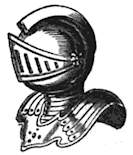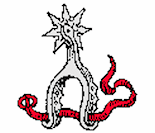The Squirearchy
 Squire is the title of a gentleman next in rank to a knight. A Squire was originally an attendant on a knight; the knight's shield or armor bearer. It was the title given to a country gentleman, and a title of magistrates and lawyers, particularly to Justices of the Peace. Ld. Lytton. The Squirearchy was the squires or gentlemen of a country taken collectively; the domination or political influence exercised by squires considered as a body. Written also Squirarehy. A Squirearch was a member of the squirearchy, Squirehood was the rank and tale of a squire, while a Squireen was a small or petty squire, a half-squire, half-farmer.
Squire is the title of a gentleman next in rank to a knight. A Squire was originally an attendant on a knight; the knight's shield or armor bearer. It was the title given to a country gentleman, and a title of magistrates and lawyers, particularly to Justices of the Peace. Ld. Lytton. The Squirearchy was the squires or gentlemen of a country taken collectively; the domination or political influence exercised by squires considered as a body. Written also Squirarehy. A Squirearch was a member of the squirearchy, Squirehood was the rank and tale of a squire, while a Squireen was a small or petty squire, a half-squire, half-farmer.
It was the leading persons among the squirearchy who held the most conspicuous seats in the English parish churches, who filled the offices of vestryman and magistrate, who owned the bulk of the lands, who lived in manor houses which their forefathers had occupied, and who, like their forefathers, followed the hounds in season, and at times partook rather freely of the bottle. And it was their ancestors whose bones lay in the chancels of the ancient rural churches, or under the defaced tombstones in the adjacent churchyards; whose memorial tablets gleamed on the interior walls of the churches themselves, and whose monuments rose in the shadow of the neighboring yews planted far beyond the recollection of living men.
Despite the rapid progress of her foreign trade and of her manufacturing industries, England was still predominantly an agricultural country, and more than three-fourths of her population lived on and by the land. The great bulk of this large number-that is to say, the main body of the English people-belonged to the class which worked with its own hands on the land : the peasantry. But there was very wide diversity among the members of this class. The class of the peasantry shaded insensibly into the next class, the cultivators of substantial farms who worked their farms by hired labor. This class included both men who owned their own farms - still a large number - and men who paid rent for them ; it may be conveniently described as the Yeomanry, though strictly speaking the term should be reserved for small proprietors. Between the prosperous peasant who occasionally hired extra labour, and the small yeoman who worked hard alongside of his men, there was no sharp distinction ; the one easily passed into the other. In the same way the yeoman class shaded insensibly into the class above it, that of the squirearchy, who may be described as the class which drew its livelihood from the rent of land. There was very little difference between a substantial yeoman and a small squire who farmed some of his own land. Thus the agricultural society, though it was divided into grades, was more or less homogeneous, and there were no such sharp distinctions of classes and interests as later arose.
The homogeneity of village society was accentuated by the way in which most villages were organised. In spite of the large number of "enclosures" which had been made during the previous centuries, probably three-fifths of the cultivated land of England was still organised on the open-field system. The arable land of the1 village was divided into very large fields, each having many strips held by many cultivators, all of whom had to agree to grow the same crops, and to plough, sow and reap at the same times. It protected the small man against the competition of his more enterprising neighbour. It also turned the village into a real community, in which everybody had a part; for all had their share in the annual discussions as to what crops should be grown. Even where it survived, the more substantial proprietors had in many cases succeeded in getting their holdings concentrated in a single block, cut out from the common fields and "enclosed," which they could cultivate as they thought best.
 The natural leaders of this homogeneous society of landowners and tillers of the soil were the Squires, the substantial landed proprietors or country gentlemen, who lived in the thousands of rural manor-houses scattered all over the country. And this leadership was recognised in the political powers which they exercised. They were, as they had been ever since the thirteenth century, the most politically active class in the community, its representatives and its real rulers. As Justices of the Peace they carried on the whole work of local administration ; and in performing this work they were scarcely at all checked or controlled by the central government.
The natural leaders of this homogeneous society of landowners and tillers of the soil were the Squires, the substantial landed proprietors or country gentlemen, who lived in the thousands of rural manor-houses scattered all over the country. And this leadership was recognised in the political powers which they exercised. They were, as they had been ever since the thirteenth century, the most politically active class in the community, its representatives and its real rulers. As Justices of the Peace they carried on the whole work of local administration ; and in performing this work they were scarcely at all checked or controlled by the central government.
Under the Tudors and Stuarts the Privy Council maintained a close supervision over them; they had been in the main simply the local agents of that powerful body. The rural districts were governed, neither by the feudal rule of the landowner in his own estate and in his own right, nor by royal bureaucrats sent down from the capital. The magistrate's authority derived from the Crown, and yet it was in effect local government and squirearchal power. This mutual dependence of the central and provincial administrations is the key to the history of the Stuart epoch. The institution of unpaid local magistrates ensured both the ill-success of the republican propaganda, and the failure of the Stuart Kings to establish a despotism without possessing a bureaucracy. For while the majority of the squires always rallied to preserve the sovereignty of the Crown, whose service had been from father to son the chief pride of many ancient families, on the other hand the same class was able in 1640 and in 1688 to maintain views of policy and religion against the will of kings from whom they derived neither income, lands, nor social esteem. The policy of the Crown depended for its execution on the active consent of magistrates, who again depended for their own social position on the good-will of the neighbouring squires, and were on such friendly terms with the middle class in town and country, that magisterial resistance to the Crown might at moments become one with the resistance of the whole nation: and it was these moments which decided the fate of England. The squirearchy preserved society from confusion and the poor from death by hunger, while at the same time it saved England's local liberties, and thereby in the long run her Parliamentary institutions.
But under the Whig oligarchy - and, indeed, ever since the Restoration - it was nobody's business to devote special attention to local government; and, accordingly, the Justices of the Peace were in the main left to their own devices, subject only to general regulations made by Parliament, whose members were nearly all themselves country gentlemen and Justices of the Peace. The powers which they wielded as Justices of the Peace gave to the squirearchy a very remarkable ascendency. They were like little kings in their own villages, and if they chose to behave as petty tyrants, as they sometimes did, there was very little chance of redress. Yet, on the whole, they performed their duties, if not with great enlightenment, at any rate with a good deal of public spirit and neighbourly good feeling. The literature of the century abounds with portraits of the Justices of the Peace. But if there are many descriptions of petty tyrannies, there are as many of generous, public-spirited and large-minded performance of public duties. Over against Fielding's description of Squire Western must be set his portrait of Squire Allworthy, and Addison's of Sir Roger de Coverley. It was only when the agrarian and industrial revolutions in the second half of the 18th Century brought about a great cleavage in rural society, and destroyed the community-spirit which had held English villages together, that the Justices of the Peace came to be regarded as enemies and oppressors of the poor.
During the later years of William's and throughout Anne's reign Whigs and Tories battled continuously for the mastery. Very unexpected things happened -unexpected to us who associate Whiggism with a "Liberal" and Toryism with a "Conservative" policy: Whigs made wars, Tories made peace: Whigs were for a Continental, Tories for an insular policy: the Whig was a Protectionist, the Tory a Free-Trader. The Whigs succeeded without bloodshed in setting George I on the throne, and banishing Toryism from a share in the government of the country for forty years.
The Tory forces were recruited from the ranks of the lower clergy, and the country squirearchy. In respect of voting power, these classes represented the majority of Englishmen: these were the defenders of "High Church" principles and the divine right of kings. By the end of the 17th Century the half-farmer, half-squire class, was still very numerous though already decreasing: a class not very accessible to new ideas, but conservative and insular by instinct and tradition, suspicious of novelties and contemptuous of "enthusiasts," inspired, like the old-fashioned Greeks, by a true and genuine hatred of foreigners, -in short, a class essentially British. These were the "old country putts," whom Amherst describes as ridiculed by their more fashionable sons : and who were destined in the progress of the years either to rise into the state of "gentlemen" or sink into that of small farmers.
|
NEWSLETTER
|
| Join the GlobalSecurity.org mailing list |
|
|
|

